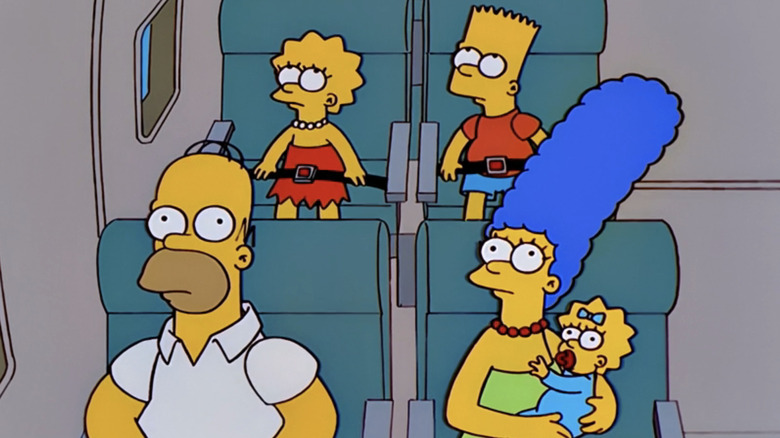
20th Television
In a BBC documentary from the early 2000s, then-showrunner of "The Simpsons" Mike Scully said, "I think that the basic rule for any 'Simpsons' writer is first and foremost you have to have a healthy disrespect for everything Americans hold dear." At least during its golden age, the show was at its core a deeply satirical take on modern American life, that, as creator Matt Groening put it in the same documentary "had no sacred cows."
But it wasn't just America at which the writers took aim. "The Simpsons" has upset audiences around the world with its subversive comedy, often managing to get itself banned in several of them. One of the most notable examples of the show taking aim at an entire country was season 6 episode, "Bart vs. Australia," which ticked off the Aussies so much with its stereotypical take on the country that, as writer and former showrunner Mike Reiss told The Age, "We were condemned in the Australian Parliament after the episode." In that instance, however, there was no official banning of the episode, which actually grew in popularity since its original airing and ended up inspiring a petition to officially change the name of Australian currency to "dollarydoo."
"Bart vs. Australia" kicked off a trend of the Simpson family annoying global cultures, but the reaction to this episode seems comparatively tame compared to some other examples where "The Simpsons" was banned outright. There was, for example, the time Germany banned "Cape Feare" due to a scene depicting a man in a Nazi-like uniform. But while that might seem understandable, other countries have just simply thrown a hissy fit over being made fun of. Here are five of the wildest times "The Simpsons" was banned.
Thirty Minutes Over Tokyo
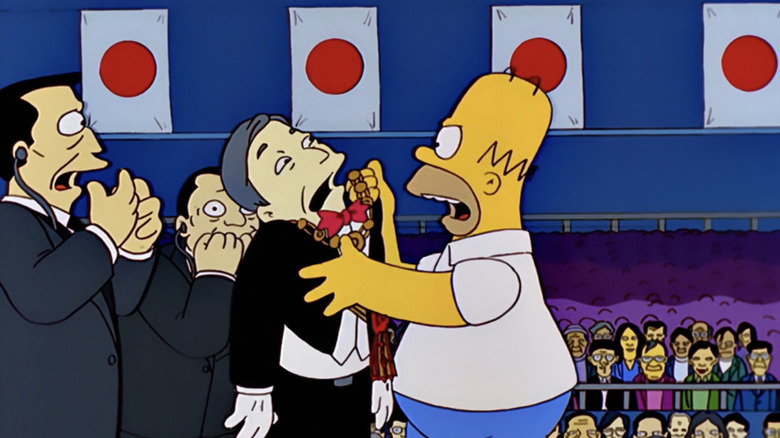
20th Television
Season 10, episode 23 sees the Simpson family travel to Japan, which was basically an excuse for the writers to take the entire country down a few notches, à la "Bart vs. Australia." In this 1999 episode, which has since become one of the most controversial installments in "Simpsons" history, the family competes on the "Happy Smile Super Challenge Family Wish Show," which is hosted by the George Takei-voiced Wink, and sees Homer blasted in the face with a flame thrower, beaten by his own family as a human piñata, and strapped to a tower to be repeatedly zapped by lightening. This is obviously a parody of Japanese game shows in the style of "Takeshi's Castle," which often showed little to no concern for the contestants' wellbeing. But this wasn't what got the episode banned from Japanese TV.
At one point, Homer and Bart attend a sumo wrestling match, where Homer picks up then-Japanese emperor, Akihito, spins him around, and throws him into a bin full of sumo thongs, possibly killing the Japanese leader and leading to Homer and Bart being imprisoned. Naturally, the country didn't take too kindly to their emperor being manhandled in this way, and "30 Minutes Over Tokyo" was never shown on TV in Japan. According to the DVD commentary for the episode, the installment also never made it to air in China, Hong Kong, or Taiwan. It's also not available on Japanese Disney+.
While potentially murdering Japan's head of state might seem like a step too far, this entire episode is so ridiculous and so obviously taking aim at everyone — including The Simpsons and their boorish American understanding of other cultures — that the ban seems just as ridiculous as the episode itself.
Goo Goo Gai Pan
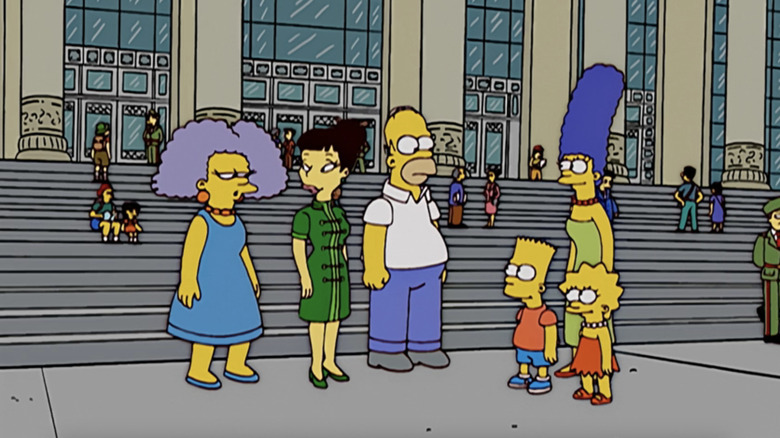
20th Television
China absolutely loves banning media from other countries, with the country's National Radio and Television Administration barring numerous beloved classics from being shown. China banned "Back to the Future" for goodness sake. Why? Because time travel is apparently a "subversive" idea. So, if the delightful hijinks of Marty and Doc Brown were banned from China, you can bet an episode of "The Simpsons" that takes numerous shots at the country was going to get caught in the net.
Season 16, episode 12 "Goo Goo Gai Pan" sees Marge's sister Selma entering menopause and deciding to adopt a Chinese orphan. This results in Selma and the Simpsons family traveling to China, where the writers take aim at several aspects of Chinese history and the Chinese Communist Party. The jokes that would be most obviously upsetting to the CCP include the family encountering a sign in Tiananmen Square that reads, "On this site, in 1989, nothing happened", and Homer mocking Mao Zedong after visiting his embalmed body and commenting that he resembles "a little angel who killed 50 million people."
Even without these inclusions, the mere fact that The Simpsons visited China was likely grounds for the National Radio and Television Administration to start coming up with reasons to ban the show. As it happened, not only did China pull the episode, but as the BBC reported, in 2006 the country banned foreign cartoons from being screened on TV between 5 p.m. and 8 p.m. — something about the effects of foreign culture on Chinese children. That might seem silly, but just think of all the young lives that were saved from slipping into depravity by banning "Back to the Future." Now banning cartoons doesn't seem so stupid, does it?
Stark Raving Dad
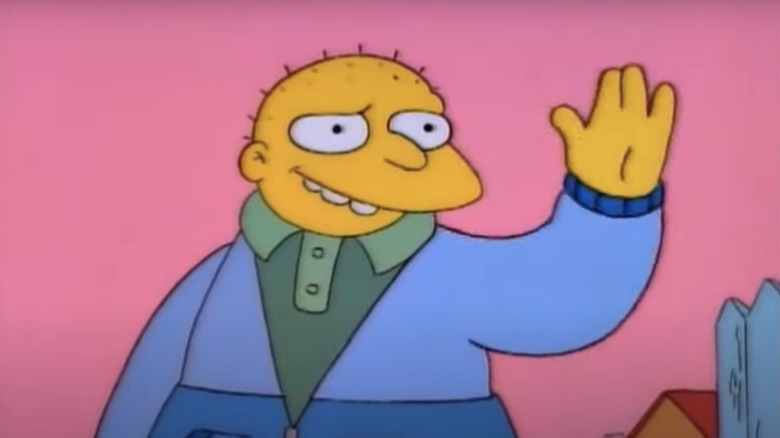
20th Television
This might be the most notorious banned episode in all of "Simpsons" history — mainly because it is banned in the country in which it was made. Season 3, episode 1, "Star Raving Dad," saw Michael Jackson guest star as a white guy named Leon Kompowsky who believed he really was the king of pop. The episode wraps up with Leon writing a birthday song for Lisa, which Jackson penned himself, originally making Leon one of the best one-off characters in "Simpsons" history. Unfortunately, things all changed after horrific accusations were made in a 2019 documentary.
What makes this particular banned episode one of the more egregious examples on this list is that executive producer James L. Brooks led the charge to have it banned. Following the airing of the HBO documentary "Leaving Neverland," which alleges that Jackson molested children over several years, the episode featuring the pop star was pulled. "It feels clearly the only choice to make," Brooks told the Wall Street Journal, explaining that he, Matt Groening, and longtime producer Al Jean had decided to remove "Stark Raving Dad" from circulation. That essentially meant that the episode was to be stricken from all the platforms and outlets on which it was available, from streaming services and TV to Blu-ray and DVDs.
One of the most nauseating quotes from Brooks at the time was this: "I'm against book burning of any kind. But this is our book, and we're allowed to take out a chapter" — as if it's somehow better to burn books when it's the authors themselves doing the burning. The decision is perhaps understandable from a certain perspective, but pretending something never happened and not allowing people to see that thing and make their own mind up as to whether they want to watch it is just so obviously misguided that "The Simpsons" season 3's banned Michael Jackson episode is perhaps the most depressing entry on this list. The last thing anyone thought after watching "Finding Neverland" was "I hope they pull that 'Simpsons' episode." But for whatever reason Brooks and co. decided they needed to self-censor.
The Cartridge Family
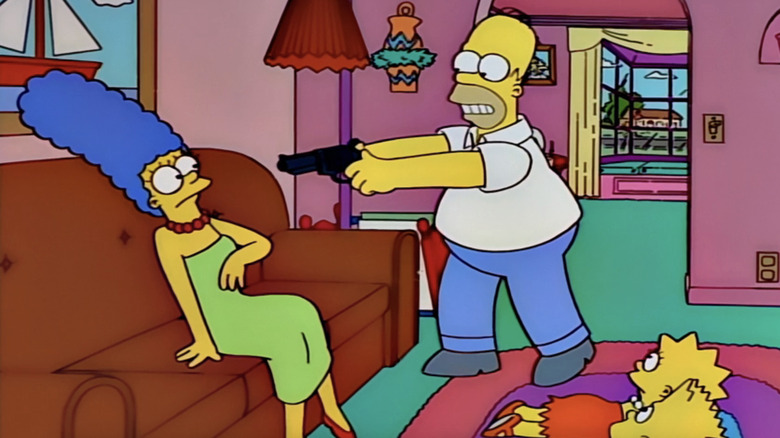
20th Television
Season 9, episode 6 saw Homer buy a gun, much to Marge — and the United Kingdom's — dismay. While the entirety of the episode hinges on Marge's disapproval of her husband's newfound passion for firearms, it actually ends with her keeping the gun for herself after Homer decides to give it up, thereby seemingly refusing to take an anti-gun stance.
"The Cartridge Family" was written by legendary "Simpsons" writer John Swartzwelder, who according to the DVD commentary track for this episode, was tasked with presenting an unbiased take on guns in America. Evidently, the content of this installment made the notoriously strict Fox censors — the same ones that banned nine separate things from "Batman: The Animated Series" — nervous, but they ultimately let the episode air unedited. The same can't be said for the Brits, however. The guys over at U.K. network Sky did not take kindly to Swartzwelder's supposedly "unbiased" view of gun ownership and pulled the episode from the air.
This turned out to be only a temporary ban, however, as "The Cartridge Family" was eventually shown on other UK networks BBC Two and Channel 4, and ultimately even aired on Sky after a while. Even then, though, the ending was changed to make it so that once Homer discarded the gun, Marge never retrieved it. While this might not be the outright government censorship seen in China, editing episodes to change the writer's intent seems like a slippery slope, though it should be noted that this is the episode with a joke about soccer being the most boring game to watch, which is probably what really got the Brits' knickers in a twist.
Blame It On Lisa
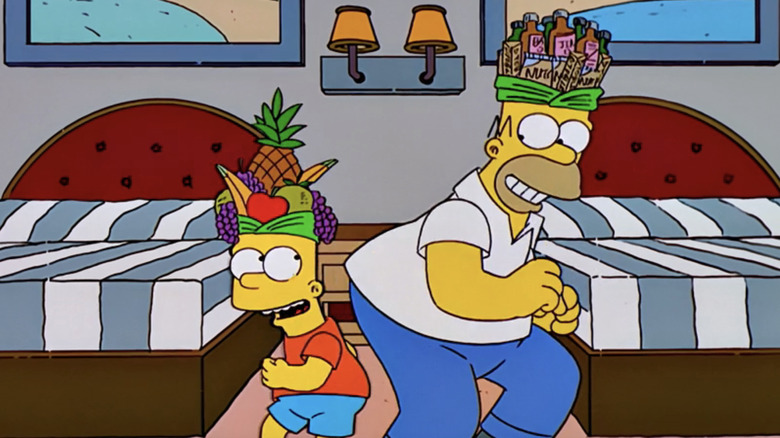
20th Television
As writer and former showrunner Mike Reiss told The Age, "Whenever we have the Simpsons visit another country, that country gets furious." At the time he gave that interview, the show had already managed to upset the Australians and get itself banned in Japan. But by far the best example of Reiss' statement is the reaction to season 13, episode 15, which saw "The Simpsons" not only upset Brazilians but prompted a legal threat from the country's tourism board.
2002 "Blame It on Lisa" follows the Simpson family as they vacation in Rio de Janeiro, and with this being "The Simpsons" there are all manner of crude jokes and unflattering observations made along the way. The episode portrays Brazil as rife with kidnappings and muggings, showing Rio de Janeiro itself as a city overrun by monkeys and rats. At one point, an unlicensed taxi driver takes Homer captive while both he and Bart are robbed by kids living on the streets of the city.
All of which made the Rio tourism board very upset, with one spokesperson saying (via the BBC) "What really hurt was the idea of the monkeys — the image that Rio de Janeiro was a jungle. It's a completely unreal image of the city" ... almost as if this wasn't a real image of the city, and was in fact a cartoon parody of the city. If you struggle to understand what kind of life you need to lead in order to get upset over a cartoon, then try to imagine this: The tourism board threatened legal action against Fox for damaging the country's international image. Better yet, imagine this: then-President Fernando Henrique Cardosa chimed in, saying the episode "brought a distorted vision of Brazilian reality." Needless to say, this particular installment was not shown in Brazil for years, though it eventually did make it to air in 2012.
Though executive producer James L. Brooks did officially apologize, thereby dodging any legal action, the only response really worth giving comes from Matt Groening In the BBC documentary "America's First Family," where he says something that every country on this list should have borne in mind, "There are these people that take the bait and they get upset and then they criticize the show and that makes it more exciting. I mean, it's just a TV show, it's a cute little cartoon."


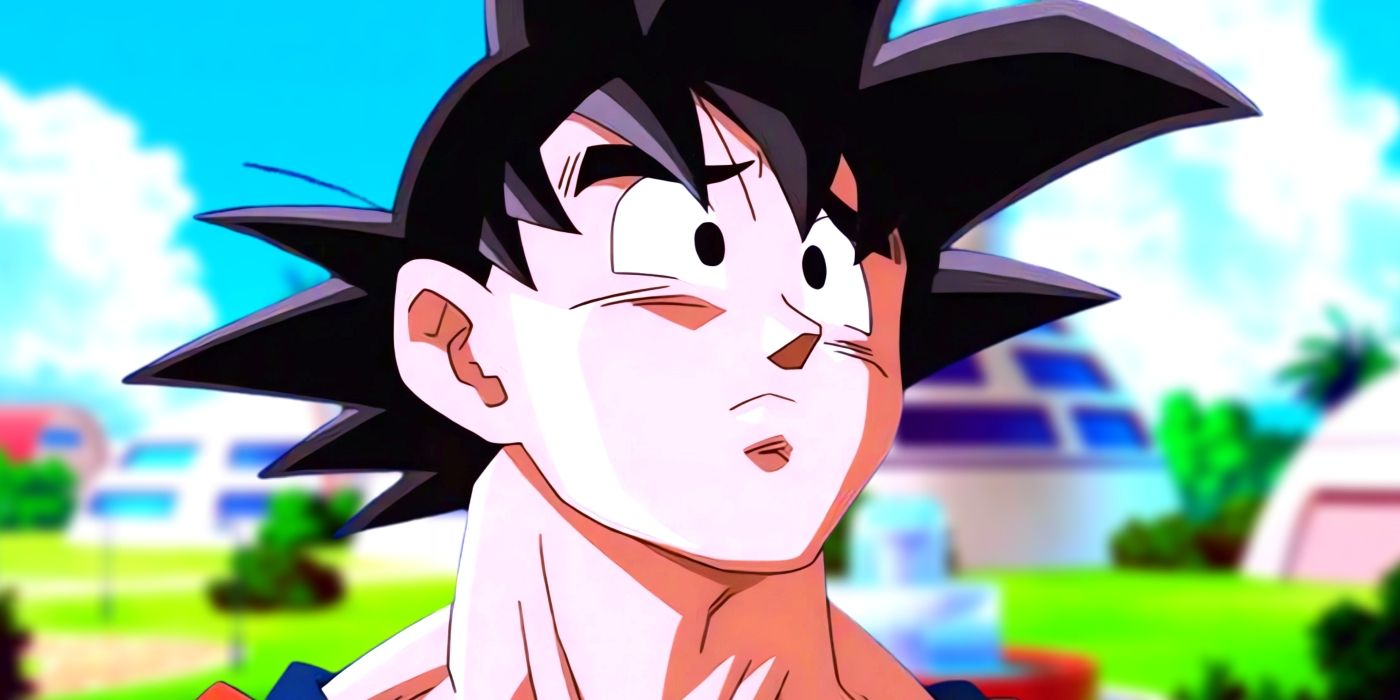






 English (US) ·
English (US) ·